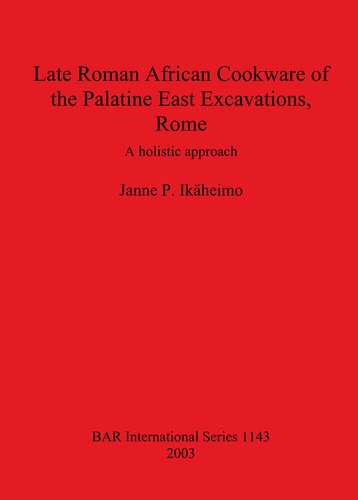

Most ebook files are in PDF format, so you can easily read them using various software such as Foxit Reader or directly on the Google Chrome browser.
Some ebook files are released by publishers in other formats such as .awz, .mobi, .epub, .fb2, etc. You may need to install specific software to read these formats on mobile/PC, such as Calibre.
Please read the tutorial at this link: https://ebookbell.com/faq
We offer FREE conversion to the popular formats you request; however, this may take some time. Therefore, right after payment, please email us, and we will try to provide the service as quickly as possible.
For some exceptional file formats or broken links (if any), please refrain from opening any disputes. Instead, email us first, and we will try to assist within a maximum of 6 hours.
EbookBell Team

5.0
90 reviewsThis volume, which is entirely devoted to African cookware, attempts to fill a gap in the field of Roman pottery studies. African cookware, one of the few Roman cooking wares subjected to voluminous interregional trade or exchange, was produced in the province of Africa Proconsularis (present-day Tunisia) from the early 1st at least to the late 5th century AD. In general, the quantity in which African cookware is frequently found outside Tunisia is another reason that makes it a rewarding subject for a detailed study. But while the state-subsidized traffic in agricultural products from Roman Africa has traditionally been regarded as a decisive factor, attention has seldom been paid to the life cycle of African cookware. As the life cycle of pottery includes all the stages from the acquisition of raw materials to the consumption of finished pots, the following discussion introduces a holistic examination of extended sherd families from some twenty-one hundred African cookware vessels found in the Late Roman deposits of the Palatine East excavations (ca. AD 270-550), one of the major excavation projects taken place in Rome within the last twenty years. The first objective of this volume is to use the study assemblage to trace down the technological choicesrelated to African cookware fabrics, forms, and other aspects of production. A further important stimulus for this study lies in the history of Roman pottery studies, the most obvious reason being the long-lasting lack of interest towards the class of undecorated common wares. It is hardly surprising that African cookware has never been studied as a unique group, but only in association with the corresponding tableware, African Red Slip ware.